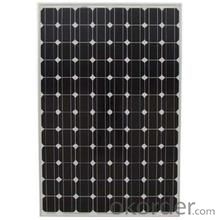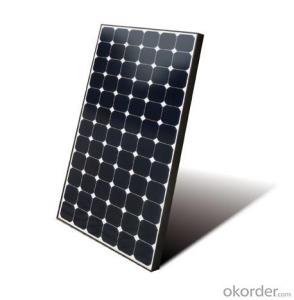CNBM On Grid System 5000W with Certificate UL TUV CE
- Loading Port:
- Shanghai
- Payment Terms:
- TT OR LC
- Min Order Qty:
- 100 watt
- Supply Capability:
- 1000 watt/month
OKorder Service Pledge
OKorder Financial Service
You Might Also Like
Item specifice
CNBM On Grid System 5000W with Certificate UL TUV CE
Product description
They range from small residential and commercial rooftop systems to large utility-scale solar power stations. Unlike stand-alone power systems, a grid-connected system rarely includes an integrated battery solution, as they are still very expensive. When conditions are right, the grid-connected PV system supplies the excess power, beyond consumption by the connected load, to the utility grid.
Connection of the photovoltaic power system can be done only through an interconnection agreement between the consumer and the utility company. The agreement details the various safety standards to be followed during the connection.[4]
Systems such as Net Metering and Feed-in Tariff which are offered by some system operators, can offset a customers electricity usage costs. In some locations though, grid technologies cannot cope with distributed generation feeding into the grid, so the export of surplus electricity is not possible and that surplus is earthed.
Grid-connected PV systems are comparatively easier to install as they do not require a battery system.[1][6]
Grid interconnection of photovoltaic (PV) power generation systems has the advantage of effective utilization of generated power because there are no storage losses involved.[7]
Grid-connected PV can cause issues with voltage regulation. The traditional grid operates under the assumption of one-way, or radial, flow. But electricity injected into the grid increases voltage, and can drive levels outside the acceptable bandwidth of ±5%.[8]
Grid-connected PV can compromise power quality. PV’s intermittent nature means rapid changes in voltage. This not only wears out voltage regulators due to frequent adjusting, but also can result in voltage flicker.[9]
Connecting to the grid poses many protection-related challenges. In addition to islanding, as mentioned above, too high levels of grid-connected PV result in problems like relay desensitization, nuisance tripping, interference with automatic reclosers, and ferroresonance.[10]

Application
Industrial
Commercial
Residential
Feature
Residential, grid-connected rooftop systems which have a capacity more than 10 kilowatts can meet the load of most consumers.[2] They can feed excess power to the grid where it is consumed by other users. The feedback is done through a meter to monitor power transferred. Photovoltaic wattage may be less than average consumption, in which case the consumer will continue to purchase grid energy, but a lesser amount than previously. If photovoltaic wattage substantially exceeds average consumption, the energy produced by the panels will be much in excess of the demand. In this case, the excess power can yield revenue by selling it to the grid. Depending on their agreement with their local grid energy company, the consumer only needs to pay the cost of electricity consumed less the value of electricity generated. This will be a negative number if more electricity is generated than consumed.[3] Additionally, in some cases, cash incentives are paid from the grid operator to the consumer.
Packaging
With carton and box
- Q:Can solar energy systems be used for powering breweries?
- Yes, solar energy systems can be used for powering breweries. Solar panels can generate electricity that can be used to power various equipment and processes in breweries, including heating water, running pumps, and powering lights. Implementing solar energy systems can help breweries reduce their environmental impact, lower their energy costs, and promote sustainability.
- Q:Can a solar energy system be installed on a sloped roof?
- A sloped roof is capable of accommodating a solar energy system. Indeed, it is quite customary to install solar panels on such roofs. The efficiency of the system can actually be enhanced by the angle and orientation of the roof. When the solar panels are tilted at the optimal angle, they absorb sunlight more effectively and generate maximum energy output. Furthermore, the incline of the roof aids in self-cleaning as rainwater effortlessly washes away any dirt or debris that might accumulate on the panels. Nevertheless, it is crucial to assess the structural stability of the roof and verify its capacity to bear the weight of the solar panels.
- Q:Can solar energy systems be used in powering electric fences or security systems?
- Yes, solar energy systems can be used to power electric fences or security systems. Solar panels can convert sunlight into electricity, which can then be stored in batteries and used to power these systems. This provides a reliable and sustainable source of energy, especially in remote areas where access to conventional power sources may be limited. Additionally, solar-powered systems are cost-effective and environmentally friendly, making them an ideal choice for powering electric fences and security systems.
- Q:Can a solar energy system be integrated with energy storage systems?
- Yes, a solar energy system can be integrated with energy storage systems. Energy storage systems, such as batteries, can be used to store excess energy generated by solar panels during the day for use during the night or cloudy periods. This integration allows for a more reliable and consistent power supply, making solar energy systems a viable option for meeting electricity demands even when the sun is not shining.
- Q:Can solar energy systems be used to power boats or yachts?
- Yes, solar energy systems can indeed be used to power boats or yachts. Solar panels can be installed on the roof or deck of a boat to capture sunlight and convert it into electricity. This electricity can then be used to power various onboard systems, such as lights, navigation equipment, communication devices, refrigeration, and even propulsion systems. The size and capacity of the solar energy system will depend on the specific power requirements of the boat or yacht, as well as the available space for installation. Solar-powered boats and yachts offer several advantages, including reduced reliance on fossil fuels, lower operational costs, quieter operation, and reduced carbon emissions. However, it is important to note that solar energy alone may not be sufficient to power larger vessels or during prolonged periods of low sunlight. In such cases, a hybrid system that combines solar energy with other power sources, such as wind or diesel generators, may be more suitable.
- Q:What is the cost of installing a solar energy system?
- The cost of installing a solar energy system can vary depending on various factors such as the size of the system, the type and quality of solar panels used, the complexity of the installation, and any additional equipment required. On average, the cost of installing a solar energy system can range from $10,000 to $30,000 or more. However, it is important to note that there are various incentives and tax credits available that can significantly reduce the upfront cost of installation. Additionally, over the long term, installing a solar energy system can result in significant savings on electricity bills, as the system generates clean and renewable energy, reducing reliance on traditional energy sources. It is advisable to consult with a professional solar installer to get an accurate estimate based on your specific requirements and location.
- Q:Can solar energy systems be used in powering shopping malls or retail centers?
- Absolutely, shopping malls or retail centers can definitely utilize solar energy systems to generate power. Solar power has gained immense popularity and cost-effectiveness in recent years, making it a viable choice for commercial establishments. The extensive rooftops and parking lots of shopping malls provide ample space for the installation of solar panels, which can produce a substantial amount of electricity to fulfill the energy requirements of these facilities. By employing solar energy systems, shopping malls and retail centers can diminish their reliance on the grid and eventually lower their energy expenses. By utilizing solar power, these establishments can save on their electricity bills and allocate these savings towards other operational expenses or improvements. Furthermore, the installation of solar panels in shopping malls and retail centers can also enhance their sustainability and environmental credentials. As renewable energy sources, solar systems generate clean electricity without emitting greenhouse gases or pollutants. By transitioning to solar power, these establishments can significantly decrease their carbon footprint and make a positive contribution to the battle against climate change. Moreover, solar panels can serve as a visible demonstration of a mall's commitment to sustainability, attracting environmentally conscious customers who prioritize shopping at eco-friendly establishments. This has the potential to increase foot traffic and revenue for these retail centers. In conclusion, shopping malls and retail centers can undoubtedly make use of solar energy systems to power their operations. By harnessing the sun's power, these establishments can reduce their energy costs, enhance their environmental sustainability, and appeal to customers who value eco-friendly shopping experiences.
- Q:Are there any tax credits available for installing a solar energy system?
- Yes, there are tax credits available for installing a solar energy system. The federal government offers a Solar Investment Tax Credit (ITC) which allows homeowners and businesses to deduct a percentage of the cost of installing a solar energy system from their federal taxes. As of 2021, the ITC offers a 26% tax credit for systems installed through the end of 2022. However, it is important to note that the tax credit will decrease to 22% in 2023 and will only apply to commercial installations. Additionally, some states also offer their own tax incentives for solar energy systems, such as tax credits, rebates, or exemptions. It is recommended to check with your state or local government to determine if there are any specific tax credits available in your area.
- Q:How much does it cost to install a solar energy system?
- The cost to install a solar energy system can vary depending on several factors such as the size of the system, location, type of panels, and installation complexity. On average, a residential solar energy system can range from $10,000 to $30,000 after considering incentives and rebates. It is recommended to get multiple quotes from reputable solar providers to determine the specific cost for your individual needs.
- Q:Can solar energy systems be used in powering recreational facilities like gyms or spas?
- Yes, solar energy systems can definitely be used to power recreational facilities like gyms or spas. Solar panels can be installed on the roofs or grounds of these facilities to convert sunlight into electricity. This renewable energy source can provide a significant portion, if not all, of the power needed to operate the facilities. Additionally, solar energy systems can help reduce the carbon footprint of these establishments and contribute to a more sustainable and environmentally friendly operation.
1. Manufacturer Overview |
|
|---|---|
| Location | |
| Year Established | |
| Annual Output Value | |
| Main Markets | |
| Company Certifications | |
2. Manufacturer Certificates |
|
|---|---|
| a) Certification Name | |
| Range | |
| Reference | |
| Validity Period | |
3. Manufacturer Capability |
|
|---|---|
| a)Trade Capacity | |
| Nearest Port | |
| Export Percentage | |
| No.of Employees in Trade Department | |
| Language Spoken: | |
| b)Factory Information | |
| Factory Size: | |
| No. of Production Lines | |
| Contract Manufacturing | |
| Product Price Range | |
Send your message to us
CNBM On Grid System 5000W with Certificate UL TUV CE
- Loading Port:
- Shanghai
- Payment Terms:
- TT OR LC
- Min Order Qty:
- 100 watt
- Supply Capability:
- 1000 watt/month
OKorder Service Pledge
OKorder Financial Service
Similar products
New products
Hot products
Related keywords





























